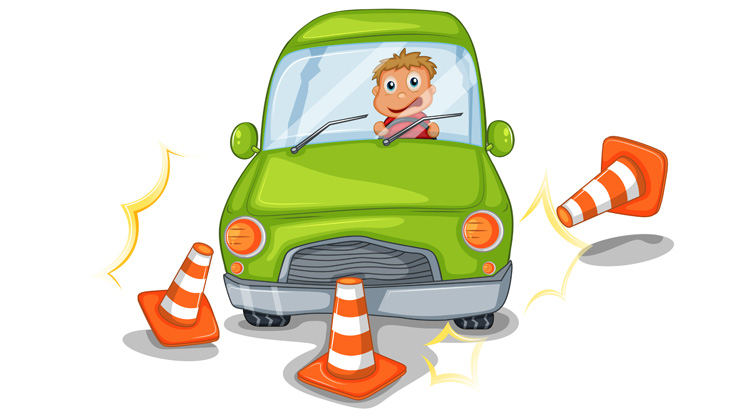
Reckless driving is one of the most serious traffic tickets that you can receive. It is considered a class A misdemeanor which means you could face up to a year in jail, probation for up to two years, and fines and costs of up to $2,500. Additionally, it could adversely affect your license in that it carries with it more points than any other traffic ticket. In addition to all the other penalties, reckless driving is a criminal offense and if you are convicted, it is a criminal conviction that will follow you around forever as it cannot be sealed or expunged from your record. Additionally, if you are charged with a DUI later in life, you would not be eligible for court supervision on that DUI charge if you have a prior reckless driving conviction in your background.
Reckless driving is codified in the at 625 ILCS 5/11-503 and states
(a) A person commits reckless driving if he or she:
(1) drives any vehicle with a willful or wanton disregard for the safety of persons or property; or
(2) knowingly drives a vehicle and uses an incline in a roadway, such as a railroad crossing, bridge approach, or hill, to cause the vehicle to become airborne.
Obviously the second part of the statute is fairly self-explanatory, no Evel Knievel stunts on a public roadway. But it gets a little trickier to determine what falls in the first category of “willful or wanton disregard for the safety of persons or property.” Luckily, Illinois case law has helped clarify that for us and has given three categories of reckless driving cases.
The first category is the commission of multiple traffic offenses which together demonstrate the driver’s willful and wanton disregard for the safety of persons and property. In other words, an officer cannot charge you with reckless driving for a single traffic offense, unless it falls into one of the other two categories.
The second category involves a driver’s conscious disregard for the particular surroundings and circumstances that rises to the level of willfulness and wantonness. The examples given within the case law include a driver backing up while squealing tires causing a car to fishtail with a child nearby, a driver veering out of his lane and towards a pedestrian in roadway, forcing the pedestrian to run out of the way, a driver passing three cars at one time forcing an oncoming car off the roadway, and a driver driving twice the speed limit around a sharp curve causing an accident.
The third category is where willful and wanton conduct is based, in part, upon the driver’s intoxication or impaired state.
Based upon the three categories listed above, a speeding ticket alone cannot be the basis for a reckless driving charge. There must be some other factor present, such as pedestrians nearby, forcing other vehicles off the roadway, or driving in a manner which causes an accident (which would be considered a separate ticket.) If none of these other factors are present, then it is not reckless driving. That however will not prevent the officer from writing the ticket and the State’s Attorney charging it. I have represented persons in this situation and I would simply present the case law to the prosecutor assigned and usually get the reckless driving charge dismissed.
By itself, reckless driving will not suspend your license. In Illinois, you need 3 traffic offenses in a year if you’re over 21, or two offenses in 2 years if you’re under 21 to lead to a suspension of driving privileges. The length of the suspension is based upon how many points are accumulated across the violations. Reckless driving carries with it 55 points, which is higher than any other traffic violation. The point scale and the suspension lengths are listed below.
15 to 44 points – 2 months
45 to 74 points – 3 months
75 to 89 points – 6 months
90 to 99 points – 9 month
100 to 109 points – 1 year
110 points or more – Revocation
Common point values associated with traffic violations
5 points – Speeding 1-10 mph above the limit
15 points – Speeding 11-14 mph above the limit
20 points – Speeding 15-25 mph above the limit
20 points – Disregarding a traffic control device
50 points – Speeding more than 25 mph above the limit
55 points – reckless driving
When charged with reckless driving, there are several ways that you can keep that conviction off your record. You could take your case to trial and receive a not guilty verdict, you could get the State’s Attorney to agree to amend or dismiss the charge, or you could receive court supervision. Court supervision is a special disposition in Illinois, whereby you plead guilty to the charges, however, no conviction enters on your record. The case will be continued for up to two years after your guilty plea and as long as you comply with all the conditions of the order, the case will be dismissed at the end of the supervision period. Usual conditions may include, paying a fine, attending a traffic safety school, and most importantly not violating the law while on court supervision. Should you successfully complete the court supervision, no conviction would go on your record, you would receive no points against your license, and it usually saves you from a drastic increases in insurance rates.
In Illinois, almost all traffic cases are not expungable, with very few exceptions. One exception is a reckless driving charge that is committed by a driver prior to his or her 25th birthday. If that driver receives and successfully completes court supervision then that reckless driving charge would be eligible for expungement after the driver turns 25.
